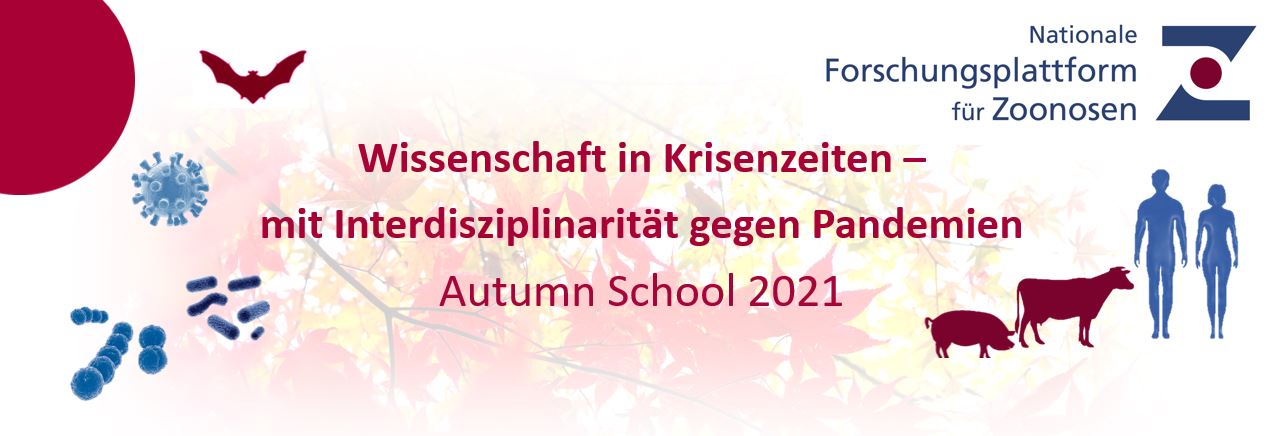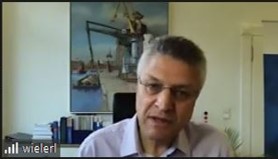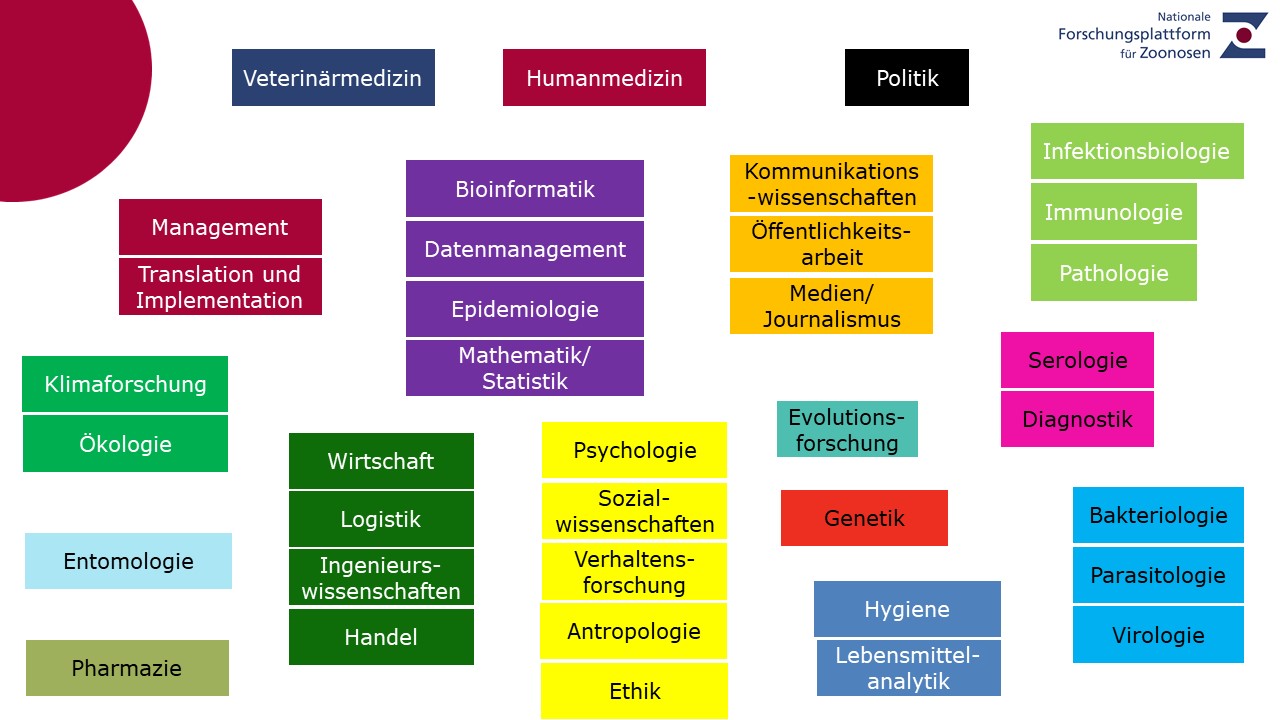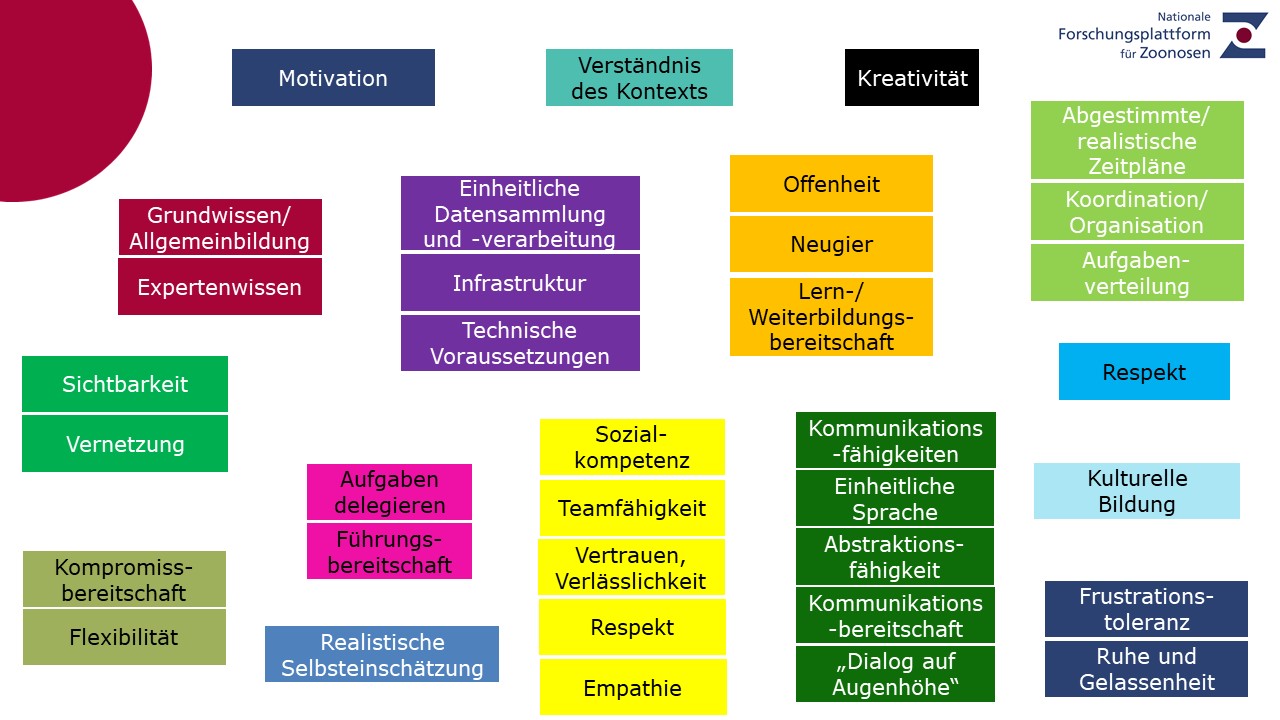
The coronavirus pandemic has a major impact on science. It has become clear that to overcome the crisis, but also to prevent future pandemics, a holistic approach and thus the collaboration of many different disciplines is necessary. This interdisciplinary approach, often referred to as "One Health", is particularly relevant for zoonoses research, which deals with pathogens transmissible between humans and animals. Why interdisciplinarity was and is important, how it should be applied in zoonoses research in the future, and what requirements must be met for this to happen were the topics of this year's autumn school of the German Research Platform for Zoonoses.
The advantages of One Health and prevention strategies
The autumn school started with a lecture by Prof. Lothar Wieler, President of the Robert Koch Institute and co-founder of the Zoonoses Platform. In his lecture, he highlighted the special features of zoonoses research and explained how his own research has been enriched by new perspectives from other disciplines. Although a holistic approach in the sense of the One Health concept is very complex, this is the only way to master future challenges. One of these challenges is the fight against antimicrobial resistance (AMR). Prof. Wieler spoke of a "silent pandemic" in this context. His long-term vision is to transform the healthcare system into a preventive system that makes it possible to largely avoid diseases instead of having to treat them. For this ambitious goal, he said, an interdisciplinary approach beyond biomedicine is necessary, in which the disciplines meet on equal terms and are open minded.

Figure 1: Lothar Wieler shared his experiences in zoonoses research with the participants of the Autumn School 2021
Seeing the whole picture - individual disciplines in zoonoses research
This introduction to interdisciplinarity was followed by a brief presentation of a selection of disciplines that play a role in zoonoses research. Here, entomology, presented by Prof. Ruth Müller (Goethe University Frankfurt a. M.), was mentioned as well as bioinformatics, which Dr. Torsten Semmler (Robert Koch Institute) introduced. In addition, Dr. Christiane Wagner-Wiening (LGL BW) gave an insight into the Public Health Service, climate and environmental research was presented by Prof. Elke Hertig (University of Augsburg) and projects from vaccine research were presented by Prof. Asisa Volz (University of Veterinary Medicine Hannover).
In the course of the morning, it became clear how each of these individual disciplines represents a small piece of the puzzle depicting the extremely complex zoonoses research world. This concept was taken up again in the afternoon, where various One Health concepts and initiatives that have formed in response to the pandemic in recent months were addressed (see PREZODE, Wildlife & Health Alliance, IPBES Workshop on Biodiversity and Pandemics, BMZ Schwerpunkt One Health).
One Health encompasses more than biomedicine
Participants worked in groups to identify the different disciplines that they believe (should) play a role in zoonotic disease research. In addition to the disciplines already addressed in the presentations, numerous other disciplines were included in the comprehensive elaboration, which, in the spirit of Prof. Wieler's presentation, go far beyond biomedicine (see Figure 2). It became clear that the young scientists already place their research in a much larger context than the networking of research in Germany currently reflects.

Figure 2: Brainstorming result of the participants on the topic "Relevant disciplines in zoonoses research"
After the relevant fields in zoonoses research had been discussed, the participants started the second day of the event with a compilation of important skills and characteristics that an interdisciplinary researcher should have. It was agreed that in addition to one's own expertise and the willingness to learn new things, social skills, good organizational skills and the ability to work in a team are important prerequisites (see Figure 3).

Figure 3: Collected results on the question "What skills are needed for interdisciplinary research?"
Success stories from interdisciplinary research
Proof that interdisciplinary research projects can not only work but also add value was provided by the examples of three research projects from the Zoonoses Platform Community. Prof. Rainer Ulrich (Friedrich-Loeffler-Institute) presented the Rodent Transmitted Pathogens Network (NaÜPa-Net), which successfully brings together rodent research, molecular epidemiology, human epidemiology, method establishment and public relations with numerous project partners throughout Germany.
Other exciting examples were provided by Dr. Sebastian Ulbert (Fraunhofer IZI) with an interdisciplinary PhD project at the interface of immunology, parasitology and physics, and Johannes Ponge (University of Münster) with the Epi- and Co-PREDICT projects, which deal with the modeling of infectious diseases. (see follow-up report workshop "The Future with Data").
Communication as a key element
Running through the various thematic blocks of the event was the realization that communication plays a key role in successful interdisciplinary research. This refers to communication between disciplines as well as communication with the public and policy makers. The last part of the Autumn School was therefore dedicated to science communication.
Understanding the perspective of others
The topic was introduced by linguist Dr. Netaya Lotze (University of Münster). She pointed out that interdisciplinary communication has parallels to intercultural communication. In both cases, communication is based on different levels of knowledge and socialization, which can make it more complex and sometimes "tougher". In addition, the mediatized world changes the forms of communication. Being aware of the complexity of the communication process could be helpful in conveying one's own messages clearly and understandably.
Communicating risks, not only in a crisis
Risk and crisis communication plays a special role in infection research. Annett Schulze from the German Federal Institute for Risk Assessment (BfR) reported on the challenges in this area. Trust, clarity and efficiency are key words here. In addition, it is essential not to communicate only when a crisis has occurred, but to act preventively and to communicate knowledge continuously, for example, in order to establish risk awareness among the population.
The event was concluded by science journalist Marleen Halbach (Science Media Center). She explained why, in her opinion, science needs science journalism as a critical observer but also as a trust-building authority. She encouraged the young scientists to become actively involved in science communication.
The Autumn School 2021 offered an exciting opportunity to deal intensively with the requirements, challenges and advantages of interdisciplinary research. Through the exciting presentations of the speakers and the active participation of the young scientists, numerous ideas were generated that can help to network zoonoses research in Germany more broadly and thus contribute to the prevention of pandemics in the long term.
Text: Dr. Dana A. Thal, German Research Platform for Zoonoses



